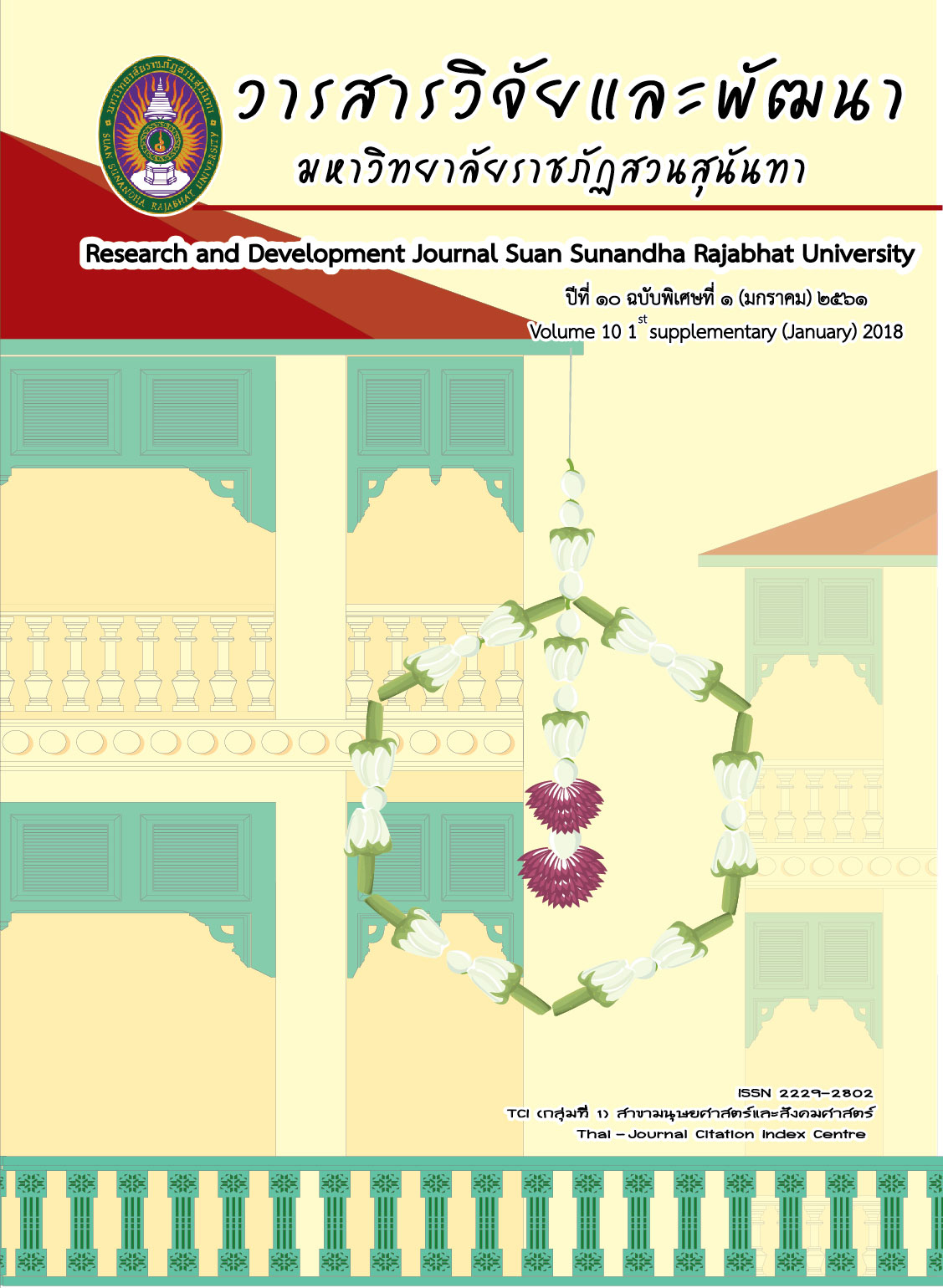ความสัมพันธ์ระหว่างปัจจัยส่วนบุคคลและความฉลาดทางอารมณ์ กับทัศนคติต่อ ปัจจัยทางวัฒนธรรมไทยของนักศึกษาปริญญาตรี
คำสำคัญ:
ความฉลาดทางอารมณท์ศนคติต่อ,วัฒนธรรมไทย ,ปัจจัยทางวัฒนธรรมไทยบทคัดย่อ
การวิจัยเรื่อง ความสัมพันธ์ระหว่างปัจจัยส่วนบุคคลและ ความฉลาดทางอารมณ์ กับทัศนคติต่อปัจจัยทาง วัฒนธรรมไทยของนักศึกษาปริญญาตรี เป็นการสำรวจภาคตัดขวาง (Cross Sectional Survey Research) มี วัตถุประสงค์เพื่อ ศึกษาทัศนคติต่อปัจจัยทางวัฒนธรรมไทยของนกั ศึกษาปริญญาตรี วิเคราะห์ความแตกต่างของ ทัศนคติตอ่ ปัจจัยทางวัฒนธรรมไทยจำแนกตามปัจจัยส่วนบุคคล ประกอบด้วย เพศ อายุ ชั้นปีที่กำลังศึกษา คณะ ที่กำลังศึกษา ภูมิลาํเนา (บ้านเกิด)จำนวนพี่น้องร่วมบิดามารดา บุตรลำดับ ที่ อาชีพบิดา อาชีพ มารดา สถานภาพ สมรสบิดามารดาและบุคคลที่อาศัยอยู่ปัจจุบันและวิเคราะห์ความสัมพันธ์ระหว่างความฉลาดทางอารมณ์กับ ทัศนคติต่อ ปัจจัยทางวัฒนธรรมไทย กลุ่มตัวอย่างจำนวน 415 ราย ใช้วิธีการสุ่มตัวอย่างอย่างง่าย (simple random sampling) จากนักศึกษาปรญิ ญาตรีทุกชั้นปี ปีการศึกษา 2557มหาวิทยาลัยราชภัฏสวนสุนันทา เก็บ รวบรวมข้อมูลด้วย แบบสอบถาม ทัศนคติต่อปัจจัยทางวัฒนธรรมไทยและแบบประเมินความฉลาดทางอารมณ์ มี ค่าความเชื่อมั่น ดังนี้ ทัศนคติต่อ ปัจจัยทางวัฒนธรรมไทย และ 0.89ความฉลาดทางอารมณ์ 0.93 วิเคราะห์ข้อมูล โดยใช้โปรแกรมสาํเร็จรูป สถิตที่ใช้คือ ค่าร้อยละ ค่าเฉลี่ย ส่วนเบี่ยงเบนมาตรฐาน ,t-test ,F-test Scheffe, และ สัมประสิทธสิ์ หสัมพันธ์แบบเพียร์สัน ผลการศึกษา พบว่า กลุ่มตัวอย่างมีทัศนคติต่อปัจจัยทางวัฒนธรรมไทยโดยรวมในระดับดีร้อยละ70.1 รอง ลง มาระดับไม่ดีและปานกลางร้อยละ15.7และ14.2ตามลำดับ ปัจจัยส่วนบุคคลที่พบว่ามีปัจจัยทางวัฒนธรรมไทย แตกต่างกันอย่างมีนัยสำคัญ (p-value<0.05) ได่แก่ ชั้นปีที่กำลังศึกษา คณะที่กำลังศึกษา ภูมิลำเนา (บ้านเกิด) อาชีพบิดาอาชีพมารดาและความฉลาดทางอารมณ์มีความสัมพันธ์กับทัศนคติต่อปัจจัยทางวัฒนธรรมไทยอย่างมี นัยสำคัญ(p-value<0.05) ดังนี้คือ ความฉลาดทางอารมณ์โดยรวมมีความสัมพันธ์ทางบวก (r=0.46) ความฉลาด ทางอารมณ์ด้านดีมีความสัมพันธ์ทางบวก (r=0.36) ความฉลาดทางอารมณ์ด้านเก่งมีความสัมพันธ์ทางบวก(r= 0.36) ความฉลาดทางอารมณ์ด้านสุขมีความสัมพันธ์ทางบวก (r=0.36) ส่วน ปัจจัยที่ไม่มีนัยสำคัญทางสถิติ (p-value>0.05)กับทัศนคติต่อปัจจัยทางวัฒนธรรมไทย ได้แก่ อายุ เพศ จำนวนพี่น้องร่วมบิดามารดา บุตรลำดับ ที่ สถานภาพสมรสบิดามารดาและบุคคลที่อาศัยอยู่ปัจจุบัน ข้อเสนอแนะ มหาวิทยาลัยราชภัฏสวนสุนันทา ควรให้ความสำคัญและควรส่งเสริมให้มีกิจกรรมส่งเสริม ทัศนคติต่อ ปัจจัยทางวัฒนธรรมไทย และความฉลาดทางอารมณ์ทั้ง ด้าน คือ ด้านดี ด้านเก่ง และด้านสุ3ข ให้แก่ นักศึกษาระดับปริญญาตรี
เอกสารอ้างอิง
Health. (2013). Emotional
Intelligence. Retrieved August
2013,from
http://www.watpon.com/test/emotio
nal_intelligence.htm
Department of Mental Health, Ministry of
Health. (2013). Emotional
Intelligence assessment for
Adult aged 18-60 years. Retrieved
August 2013, from
http://www.watpon.com/test/emotio
nal.htm
Pattranuprawat, R. (1998). Role of Art and
Culture Center of Private
Institution of Higher Education and
Development. Retrieved August
2013, from
http://www.culture.go.th/research/b
angkok/41_12.html
Pandaeng, S. (2004). The relationship
between emotional intelligence
and attitudes toward the
violence of secondary school
students : a case study of
Kanchanapisekwitthayalai Krabi
School. Retrieved March 2013, from
http://dric.nrct.go.th/bookdetail.php?
book_id=143663
Wade Boggs.(2017).A positive attitude,
causes a chain reaction of positive
thoughtsevens and outcomes.
Retrieved September 2013, from
https://www.brainyquote.com/quote
s/quotes/w/wadeboggs311616.html
Winston Churchill .(2017). Attitude is a little
thing that makes a big difference.
Retrieved September 2013, from
https://www.brainyquote.com/quote
s/quotes/w/winstonchu104164.html
Wiyoonchart C.(2010).How to have a good
EQ. Retrieved March 2017,
fromhttp://www.si.mahidol.ac.th/sid
octor/e-pl/articledetail.asp?id=684
Yodkaew, P. (2010). Relationship between
Attitude toward Dhramma Education
and Ethical Behavior among
Students of Siam University.
Retrieved September 2014, from
http://www.
gotoknow.org/posts/436550
Yurarut, S. (2007). Theory of Attitude
measurement. Retrieved August
2013, from
http://www.bloggang.com/viewdiary.
php?id=inthedark
&month=062007&date=27&group=2
&gblog=27.
ดาวน์โหลด
เผยแพร่แล้ว
รูปแบบการอ้างอิง
ฉบับ
ประเภทบทความ
สัญญาอนุญาต
บทความที่ได้รับการตีพิมพ์เป็นลิขสิทธิ์ของ สถาบันวิจัยและพัฒนา มหาวิทยาลัยราชภัฎสวนสุนันทา
ข้อความที่ปรากฏในบทความแต่ละเรื่องในวารสารวิชาการเล่มนี้เป็นความคิดเห็นส่วนตัวของผู้เขียนแต่ละท่านไม่เกี่ยวข้องกับมหาวิทยาลัยราชภัฎสวนสุนันทา และคณาจารย์ท่านอื่นๆในมหาวิทยาลัยฯ แต่อย่างใด ความรับผิดชอบองค์ประกอบทั้งหมดของบทความแต่ละเรื่องเป็นของผู้เขียนแต่ละท่าน หากมีความผิดพลาดใดๆ ผู้เขียนแต่ละท่านจะรับผิดชอบบทความของตนเองแต่ผู้เดียว





